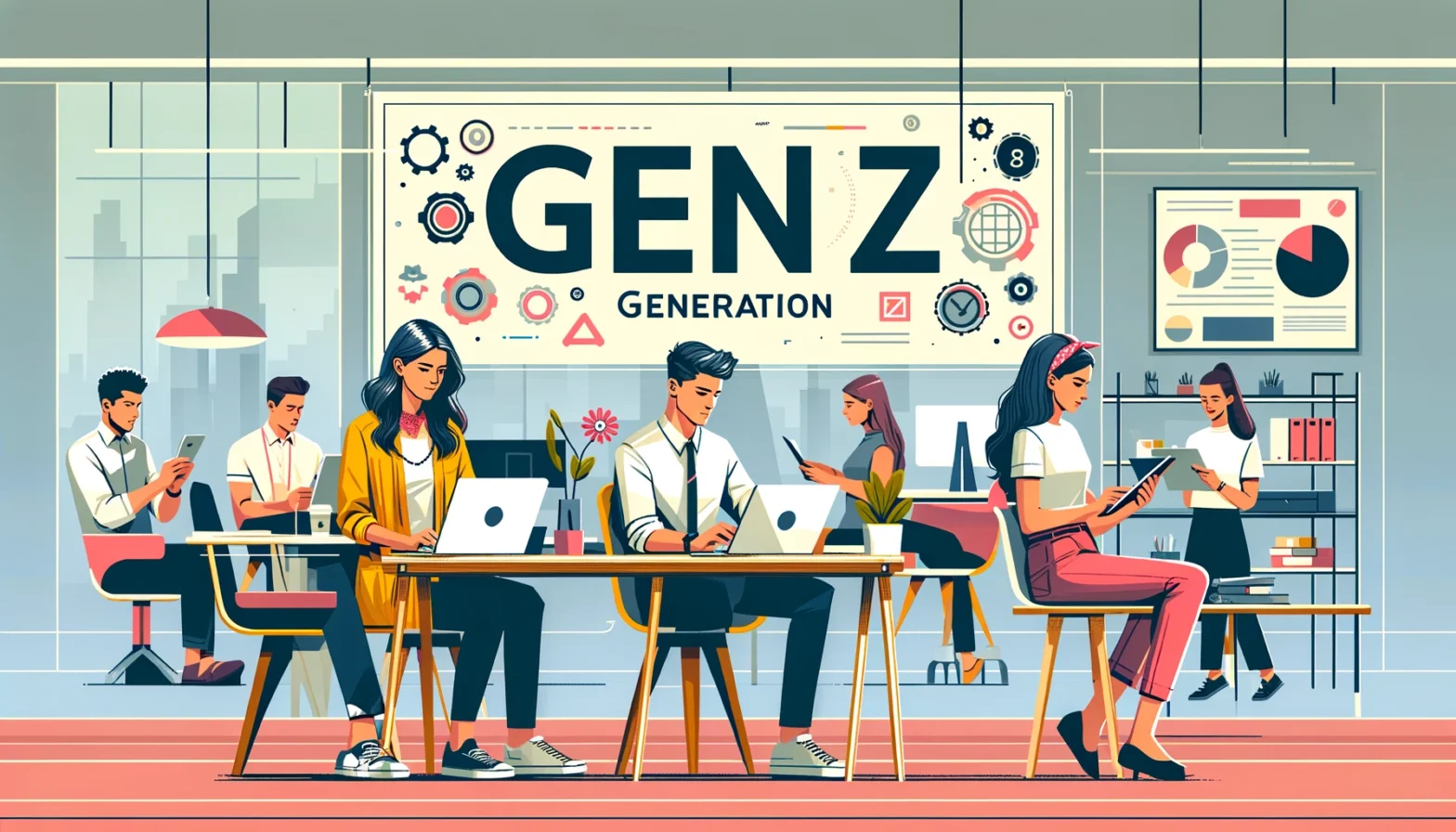Are You Ready to Welcome Gen Z? The Newest and Youngest Generation who Entrants into Today’s Workforce
Gen Z, the freshest talent to enter the workforce, presents a new set of challenges and expectations as talent acquisition and managing multigenerational teams get increasingly involved. Generation Z is considered as those who born between 1995 and 2012. Unlike the generations coming before, Gen Z cares about alignment with the expectations of the workplace, and they’re more likely than others to leave organizations that don’t meet those needs (Aggarwal et al., 2020). The evolution represents a widening chasm between how many 'traditional' workplaces operate and Gen Z’s demand for inclusivity, flexibility, and meaningful work (Becton, Walker and Jones‐Farmer, 2014).
Workplace Expectations of Gen Z
Unlike previous generations, Gen Z has greatly different workplace expectations (Dhingra & Mandlaus, 2021). They prefer for flexibility, work life balance and opportunities for personal growth and are more ready to depart organizations that don’t keep abreast with their values. Gen Z is unlike other generations, when it comes to working environments, it wants to be transparent, there should be inclusiveness and a commitment towards the purpose of Corporate Social Responsibility (Anand & Mukesh, 2024). Gen Z is particularly selective about where they work, looking for places that align with ethical beliefs and have a clear sense of purpose - a priority for all of us, but perhaps an even higher priority for the generation emerging right now.
Designing Roles That Attract Gen Z Talent
HR and members of management can design jobs to draw and retain Gen Z’s attention by focusing on growth, impact and personal development. By providing structured career development paths, mentorship programs, and project-based assignments, offering Gen Z employees the opportunity to really make a permanent difference within the business. Gen Z’s career aspirations are in creating a supportive environment where their expertise is valued, they have autonomy, the opportunities to out of the box innovate, and creatively tackle problems. By taking this approach, they not only engage them better, but they feel more drawn to the company’s mission and values – which is what Gen Z was really looking for: meaningful work with a lasting impact (Maulida, 2024).
Employ Right Technology to Engage with Gen Z
A digital first generation, Gen Z thrives in tech driven environments. Through the use of collaboration platforms, virtual training programs, and mobile communication channels, you can maintain engagement of their teams and improve team connectivity back. Organizations that are embracing the latest digital tools are building an interactive, flexible experience that is tailored to Gen Z’s tech focused expectations, making work available and more easily fitting with their preferred styles of interaction (Grensing-Pophal, 2024).
Creating a flexible, purpose driven, and tech enabled workplace is what meets Gen Z’s expectations. If organizations make an effort to adapt to their culture of growth, transparency, and innovation, Gen Z talent will be drawn, and kept, and leverage a resilient, future ready workforce which will help propel a company forward amidst a constantly changing landscape.
References
Aggarwal, A., Sadhna, P., Gupta, S., Mittal, A. and Rastogi, S., 2020. Gen Z entering the workforce: Restructuring HR policies and practices for fostering the task performance and organizational commitment. Journal of Public Affairs, 22(3). https://doi.org/10.1002/pa.2535.
Anand and Mukesh, 2024. A study on workplace expectations of Gen Z among the MBA students with special reference to Thanjavur and Trichy districts. International Journal of Research Publication and Reviews, 5(4), pp.7813–7820.
Becton, J.B., Walker, H.J. and Jones‐Farmer, A., 2014. Generational differences in workplace behavior. Journal of Applied Social Psychology, 44(3), pp.175–189. https://doi.org/10.1111/jasp.12208.
Dhingra and Mandlaus, 2021. Expectations of Generation Z from the workplace. Amity Journal of Management, 9(2), pp.1–14.
Grensing-Pophal, L., 2024. Using technology to engage Generation Z. [online] SHRM. Available at: <https://www.shrm.org/topics-tools/news/technology/using-technology-engage-generation-z> [Accessed 14 April 2025].
Maulida, L., 2024. How to attract and Retain Gen Z talent: An Ultimate guide. [online] Talentport. Available at: <https://www.talentport.com/blog/how-to-attract-gen-z-talent> [Accessed 15 April 2025].



This was an insightful and correct read. Gen Z is definitely redefining what it means to be part of the modern workforce. I really appreciated the emphasis on purpose-driven work, flexibility, and tech-forward engagement—these are key factors that organizations can no longer afford to ignore. It’s interesting to see how Gen Z is raising the bar for absorption and corporate responsibility, pushing companies to evolve not just in how they work, but why they work. Excited to see how businesses continue to adapt and innovate to build environments that not only attract, but truly empower this Z generation of professionals.
ReplyDeleteThank you for your insightful comment! You’re spot on—Gen Z is pushing for purpose-driven work, flexibility, and tech-forward engagement, which is prompting companies to rethink not just how they work, but why they work. As businesses adapt, creating a meaningful, values-driven workplace will be key to attracting and empowering this generation. It’s exciting to see how these shifts will shape the future of work!
DeleteThe blog gives a good overview of what Gen Z wants at work, but I wonder if all Gen Z employees really want the same things. Are we putting too much focus on tech and flexibility? What about those who value job security or prefer clear instructions? Also, some workplaces may not have the budget or tools to meet all these needs. Is it fair to expect every company to change completely for one generation? The ideas are interesting, but can they work for every industry and business size?
ReplyDeleteYou make a great point! While many Gen Z employees value tech, flexibility, and purpose-driven work, not all share the same preferences. Some may prioritize job security or structure. For businesses with limited resources, it’s about finding a balance that works for both the employees and the organization’s capabilities. Tailoring HR strategies to meet diverse needs while considering industry and size is key.
DeleteThis article offers a comprehensive exploration of the unique characteristics and expectations of Gen Z in the workplace. Your emphasis on authenticity, digital fluency, and purpose-driven work aligns well with current research on this generation. As organizations strive to attract and retain Gen Z talent, understanding their values and communication preferences becomes paramount. Your insights provide valuable guidance for leaders aiming to create inclusive and engaging environments for the newest entrants to the workforce. Thank you for shedding light on this timely and important topic.
ReplyDeleteI sincerely appreciate your considerate reply. I'm so happy that the article struck a chord with you. As you noted, Gen Z is bringing a new perspective to the workplace, and their focus on meaningful work, digital connections, and authenticity is changing the way that companies interact with talent. Seeing leaders embracing this change and fostering conditions that allow the next generation to flourish is heartening. Thank you for contributing your voice to the discussion!
DeleteThe blog emphasizes how companies can meet Gen Z employees' expectations by creating a flexible, purpose-driven, and tech-enabled workplace. Discussing how companies could balance Gen Z's desires with other generations' needs in the workplace would deepen the conversation. How can companies meet Gen Z's expectations for the workplace while supporting a steady and inclusive atmosphere for all generations?How can companies guarantee that their Gen Z workplace initiatives promote harmony and inclusion for all generations?
ReplyDeleteI appreciate your insightful and significant comment. While understanding and meeting Gen Z's expectations is important, you've brought up an important point: long-term success and harmony in the workplace depend on designing a space that works for *all* generations. Businesses can achieve this balance by encouraging candid conversations among all age groups, providing flexible options as opposed to one-size-fits-all solutions, and creating policies based on common values like growth, respect, and purpose. Stronger cooperation and reciprocal learning are made possible when generational needs are viewed as complementary rather than competitive. Thank you so much for adding this nuanced viewpoint to the discussion!
DeleteExcellent observations! It's evident that Gen Z values professional development, impact, and growth. In your opinion, how can businesses best assess how well these tactics—such as project-based work or mentorship programs—achieve making Gen Z workers feel genuinely involved and a part of the organization's mission? Your opinions on how to monitor the success of creating meaningful work for this generation would be greatly appreciated!
ReplyDeleteI appreciate your kind words and your thoughtful inquiry very much. You're entirely correct. Purpose, development, and a genuine sense of connection to one's work are highly valued by Generation Z. Companies can use a combination of qualitative and quantitative feedback, such as frequent pulse surveys, stay interviews, and even casual check-ins that emphasize engagement and alignment with the company's mission, to evaluate the success of programs like project-based work or mentorship programs. Monitoring Gen Z employee retention, internal mobility, and participation rates can also provide insightful data. Above all, making room for continuous, reciprocal feedback guarantees that these initiatives remain current and genuinely significant. Thank you so much for starting such a crucial discussion!
Delete